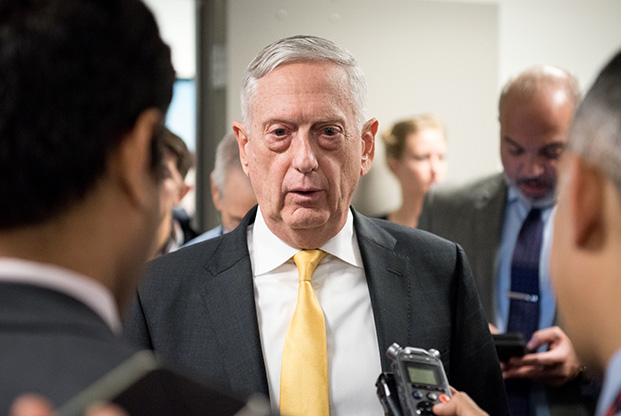
Defense Secretary Jim Mattis speaks with reporters at the Pentagon on Nov. 21. DoD photo by Army Sgt. Amber Smith.
Despite continued allegations of civilian casualties and the alleged murder of a Washington Post journalist, the US shouldn’t further limit its military support for the Saudi-led coalition in Yemen as negotiations to end that conflict approach, Defense Secretary Jim Mattis told lawmakers on Wednesday.
However, shortly after the briefing, the Senate overwhelmingly voted to open floor debate on a resolution to end US support to the Saudi coalition.
Mattis and Secretary of State Mike Pompeo briefed senators about the administration’s policy on Yemen behind closed doors, but the Pentagon released a transcript of his opening statement. Mattis said the US is supporting the Saudi coalition because of the country’s importance as a regional ally and the breakout of the civil war has severely limited the United States’ ability to target al Qaeda in Yemen.
While the US military has recently suspended its aerial refueling support for the Saudi coalition, American advisers are still providing targeting support and intelligence sharing as part of continued efforts to stop Iranian-backed Houthi militias.
“We have made progress, and the commander of the Royal Saudi Air Force has gone face-to-face at every Saudi airbase to give strong command endorsement of our targeting procedures,” Mattis said. “While tragedies occur in war, we assess restraint and improved tactical judgment by Arab coalition pilots has reduced the risk of civilian casualties.”
The Pentagon is continuously re-evaluating its operations, Mattis said, but they should not be further scaled back and the sales of weapons to Saudi Arabia should continue.
“Pulling back our limited US military support, our weapons sales to our partners, and our protection of the Saudi and Emirati populations would be misguided on the eve of the promising initial negotiations,” Mattis said. “It took us too long to get here, but at this key juncture, a change in our approach would … [breathe] new life into the Houthi’s combat operations, just when they are reluctantly engaging with the UN interlocutor.”
Lawmakers immediately criticized the briefing as “inadequate,” saying it did not include CIA Director Gina Haspel. Sen. Lindsey Graham (R-S.C.), told reporters after the briefing that while the alliance is important, the US needs more answers about whether Saudi Crown Prince Mohammed bin Salman was behind the murder of Jamal Khashoggi, the Post columnist. Graham said it would be “hard” to vote for any spending bill until there is a briefing.
“I get Yemen, I understand the strategic relationship between us and Saudi Arabia, but I’m not going to blow past this,” Graham said.
Mattis, speaking with reporters later on Wednesday at the Pentagon, said there is no “smoking gun” directly connecting Saudi Crown Prince Mohammed Bin Salman with the Khashoggi murder, even though the CIA has previously said it has high confidence the Crown Prince ordered the murder.
SASC Ranking Member Sen. Jack Reed (D-R.I.) said before the briefing he is adding his support behind a measure to end US support for the Saudi effort in Yemen. Senate Foreign Relations Committee Chairman Sen. Bob Corker (R-Tenn.) also said Wednesday he would support the measure to end support if the administration does not put forward a strong enough response to the alleged murder and continued civilian casualties from the Saudi-led coalition.